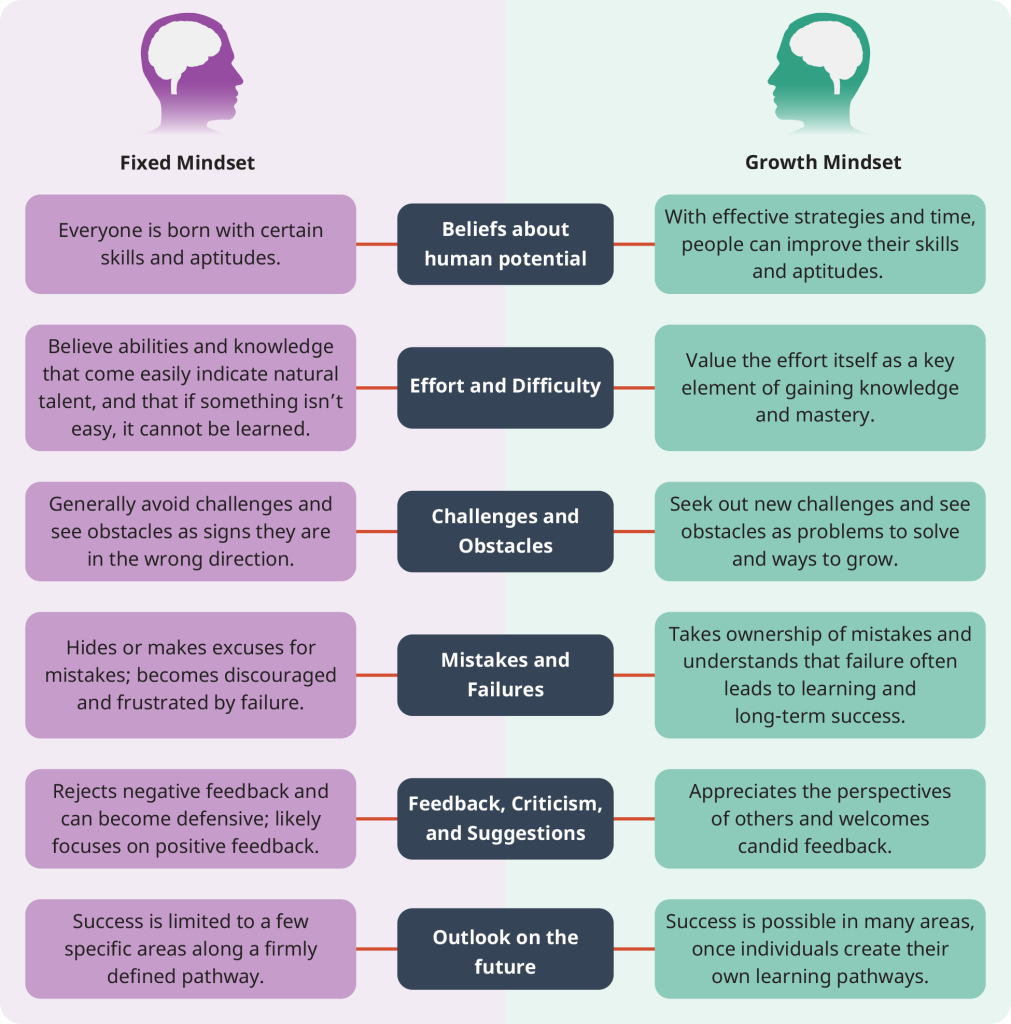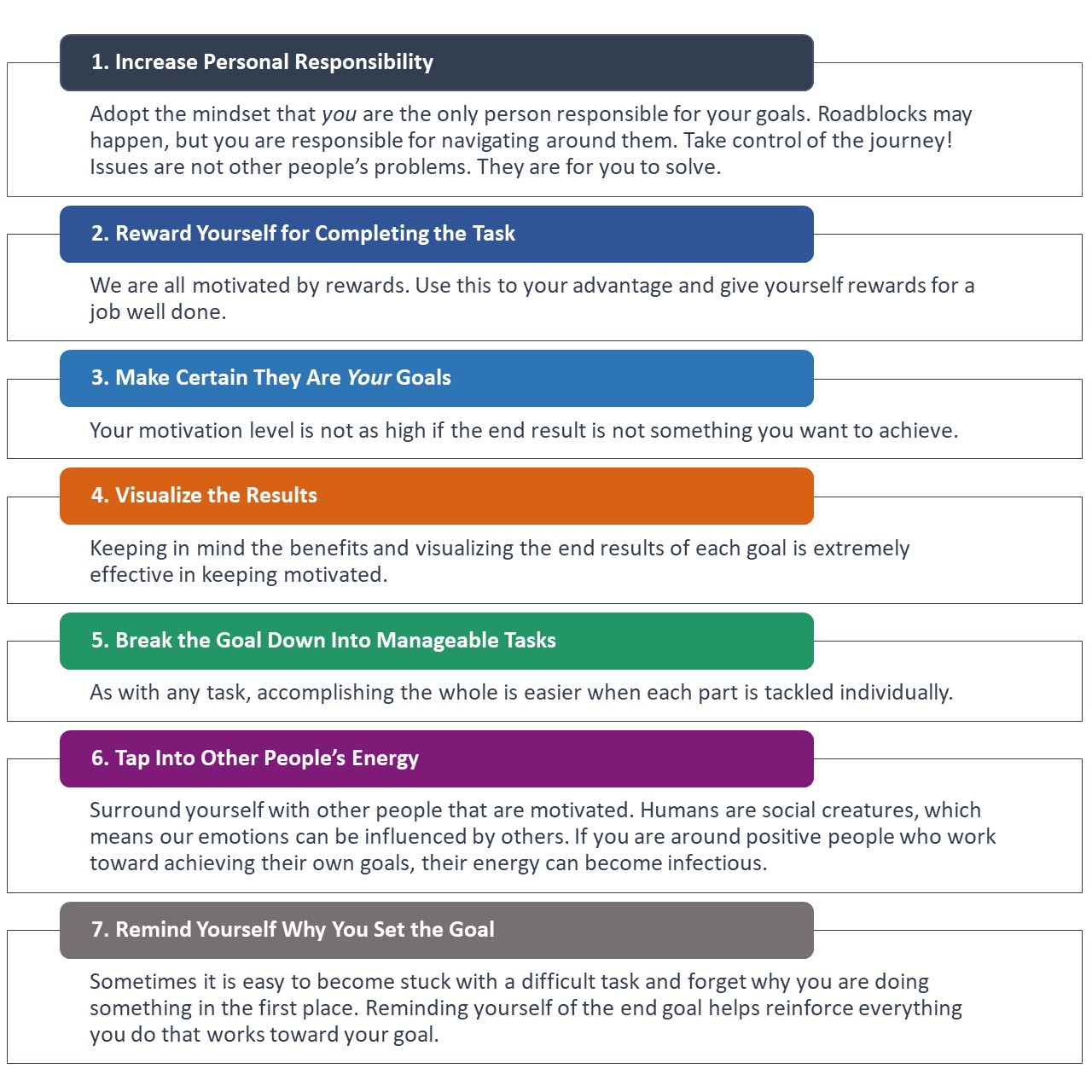23 Setting Goals
Setting Goals
Emilie Jackson
Learning Objectives
After reading this page, you will be able to:
- set goals that focus on learning;
- develop motivational goals;
- use the SMART goal system.
Why Is This Important?
Success in college does not typically happen by accident. Students must have some motivation to achieve success. Motivation often means the difference between success and failure. Motivation applies to school, to specific tasks, and to life in general. One of the most effective ways to keep motivated is to set goals, but it is important to remember that goals always require action to complete. Setting goals is something that is frequently talked about, but it is often treated as something abstract. Goal setting is best done with careful thought and planning.

What is a Goal?
The first thing to know about goal setting is that a goal is a specific end result that you desire. Goals can be big or small. A goal can range from I am going to write one extra page tonight, to I am going to work to get an A in this course, all the way to I am going to graduate in the top of my class so I can start my career with a really good job. The great thing about goals is that they can include and influence a number of other tasks that all work toward a much bigger picture. For example, if your goal is to get an A in a certain course, all the reading, studying, and completing of assignments you do for that course contribute to the larger goal of graduating at the top of your class. The larger goal helps motivate you to do each of those smaller tasks and to do them well.
Set Learning Goals
Learning vs. Performance Goals
Much of our ability to learn is governed by our motivations and goals. Sometimes hidden goals or mindsets can impact the learning process. In truth, we all have goals that we might not be fully aware of, or if we are aware of them, we might not understand how they help or restrict our ability to learn. An illustration of this can be seen if we compare a student that has performance-based goals with a student that has learning-based goals.
For example, if you are a student who is strictly performance-goal-oriented, you might only says things in a classroom discussion when you think it will make you look knowledgeable to the instructor or your classmates. On the other hand, if you are a student who is learning-goal-oriented, your interactions in classroom discussions will look quite different. You see the opportunity to share ideas and ask questions as a way to gain knowledge quickly. In a classroom discussion, you can ask for clarification immediately if you don’t quite understand what is being discussed. If you are a person guided by learning goals, you are less worried about what others think since you are there to learn and you see that as the most important goal.
Another example where the difference between the mindsets of performance-based goals and learning-based goals is clear can be found in assignments and other coursework. If you are a student who is more concerned about performance, you may avoid work that is challenging. You will take the “easy A” route by relying on what you already know. You will not step out of your comfort zone because your goals are based on approval of your performance instead of being motivated by learning. However, if you are a student who is motivated by learning goals, you may actively seek challenging assignments, and you will put a great deal of effort into using the assignment to expand on what you already know. While getting a good grade is important to you, what is even more important is the learning itself.
If you find that you sometimes lean toward performance-based goals, do not feel discouraged. Many of the best students tend to initially focus on performance until they begin to see the ways it can restrict their learning. The key to switching to learning-based goals is a matter of recognizing that focusing on learning can positively impact your success in college and in life.[1]
Fixed vs. Growth Mindset
The research-based model of the fixed and growth mindsets and their influence on learning was presented in 1988 by Carol Dweck. In Dr. Dweck’s work, she determined that a student’s perception about their own learning, accompanied by a broader goal of learning, had a significant influence on their ability to overcome challenges and grow in knowledge and ability. This has become known as the fixed vs. growth mindset model. In this model, the performance–goal-oriented student is represented by the fixed mindset, while the learning–goal-oriented student is represented by the growth mindset.
In the following graphic, based on Dr. Dweck’s research, you can see how many of the components associated with learning are impacted by these two mindsets.

If you believe you can learn something new, you greatly improve your ability to learn. At first, this may seem like the sort of feel-good advice we often encounter in social media posts or quotes that are intended to inspire or motivate us (such as “Believe in yourself!”), but in looking at the differences outlined between a fixed and a growth mindset, you can see how each part of the growth-mindset path would increase your probability of success when it came to learning.[2]
Exercise
This survey has been designed to explore ideas about your intelligence (statements 1-4) and character (statements 5-8). Reach each statement and give yourself a score that best describes you. Add up the scores for a total. Read the feedback for your total score when you’ve completed the survey.
| 1. Your intelligence is something very basic about you that you can’t change very much. | |||
| Strongly Disagree | Disagree | Agree | Strongly Agree |
| 4 | 3 | 2 | 1 |
| 2. You can learn new things, but you can’t really change how intelligent you are. | |||
| Strongly Disagree | Disagree | Agree | Strongly Agree |
| 4 | 3 | 2 | 1 |
| 3. No matter how much intelligence you have, you can always change it quite a bit. | |||
| Strongly Disagree | Disagree | Agree | Strongly Agree |
| 4 | 3 | 2 | 1 |
| 4. You can always substantially change how intelligent you are. | |||
| Strongly Disagree | Disagree | Agree | Strongly Agree |
| 4 | 3 | 2 | 1 |
| 5. You are a certain kind of person, and there is not much that can be done to really change that. | |||
| Strongly Disagree | Disagree | Agree | Strongly Agree |
| 4 | 3 | 2 | 1 |
| 6. No matter what kind of person you are, you can always change substantially. | |||
| Strongly Disagree | Disagree | Agree | Strongly Agree |
| 4 | 3 | 2 | 1 |
| 7. You can do things differently, but the important parts of who you are can’t really be changed. | |||
| Strongly Disagree | Disagree | Agree | Strongly Agree |
| 4 | 3 | 2 | 1 |
| 8. You can always change basic things about the kind of person you are. | |||
| Strongly Disagree | Disagree | Agree | Strongly Agree |
| 4 | 3 | 2 | 1 |
Total scores can be interpreted as follows:
4-6: You have a strong fixed mindset. This will likely be a barrier to your learning.
7-10: You have a fixed mindset with some growth ideas. You may experience some barriers to your learning, particularly when experiencing challenges.
10-13: You have a growth mindset with some fixed ideas. Your growth mindset will be helpful when learning new things and experiencing challenges, but your fixed ideas may still create some barriers.
14-16: You have a strong growth mindset. Your growth mindset will help you achieve success in college as you will be able to tackle challenges with an openness for learning.[3]
Set Motivating Goals
When you set a goal, it is important that the goal comes from you. If the goal is not something you are really interested in, there is little motivational drive to achieve it. Think back to when you were much younger and some well-meaning adult set a goal for you — something that didn’t really appeal to you at all. How motivated were you to achieve the goal? More than likely, if you were successful at all in meeting the assigned goal, it was because you were motivated by earning the approval of someone or receiving a possible reward, or you were concerned with avoiding something adverse that might happen if you did not do what you were told. From an honest perspective in that situation, your real goal was based on something else, not meeting the goal that was set for you. To get the most from the goals you set, make sure they are things that you are interested in achieving.
That is not to say you shouldn’t set goals that are supported by other motivations (for example, telling yourself that if you finish studying by Friday, you can go out on Saturday), but the idea is to be honest with yourself about what is important and why.
As with anything else, the key to reaching goals is to keep yourself motivated. In the following graphic you will find seven methods that highly successful people use to stay motivated.[4]

Set SMART Goals
Goals should be SMART. In this case, the word smart is not only a description of the type of goal, but it is also an acronym that stands for specific, measurable, attainable, relevant, and time-bound. The reason these are all desirable traits for your goals is because they not only help you plan how to meet the goal, but they can also contribute to your decision-making processes during the planning stage.
What does it mean to create SMART goals?
- Specific — For a goal to be specific, it must be defined enough to actually determine the goal. A goal of get a good job when I graduate is too general. It doesn’t define what a good job is. In fact, it doesn’t even necessarily include a job in your chosen profession. A more specific goal would be get hired as a nurse in a place of employment where it is enjoyable to work and that has room for promotion.
- Measurable — The concept of measurable is one that is often overlooked when setting goals. What this means is that the goal should have clearly defined outcomes that are detailed enough to measure and can be used for planning how you will achieve the goal. For example, setting a goal of doing well in school is undefined, but setting a goal of graduating with a GPA above 3.0 is measurable and something you can work toward. If your goal is measurable, you can know ahead of time how many points you will have to earn on a specific assignment to stay in that range or how many points you will need to make up in the next assignment if you do not do as well as you planned.
- Attainable — Attainable or achievable goals mean they are reasonable and within your ability to accomplish. While a goal of make one million dollars by the end of the week is something that would be nice to achieve, the odds that you could make that happen in a single week are not very realistic.
- Relevant — For goal setting, relevant means it applies to the situation. In relation to college, a goal of getting a horse to ride to school is not very relevant, but getting dependable transportation is something that would contribute to your success in school.
- Time-bound — Setting a time-bound goal means you have a specific time frame to achieve the goal. I will get my paper written sometime soon does not help you plan how and when you will accomplish the goal. I will get my paper written by Wednesday is time-bound. You know when you have to meet the goal. [5]
Exercise
The following multiple choice questions include goals that do and do not follow the SMART system. As you read each one, think about what elements make them SMART or how you might change those that are not.[6]
Key Takeaway
Setting goals, big or small, that are focused on learning will help you feel motivated in college and keep you on the path to success.
- College Success by Amy Baldwin. Licensed under a Creative Commons Attribution-ShareAlike 4.0 International License. https://openstax.org/books/college-success/pages/2-3-its-all-in-the-mindset ↵
- https://openstax.org/books/college-success/pages/2-3-its-all-in-the-mindset ↵
- Adapted from https://positivepsychology.com/wp-content/uploads/The-Mindset-Survey.pdf ↵
- https://openstax.org/books/college-success/pages/3-6-goal-setting-and-motivation ↵
- https://openstax.org/books/college-success/pages/3-6-goal-setting-and-motivation ↵
- Examples from https://openstax.org/books/college-success/pages/3-6-goal-setting-and-motivation ↵

